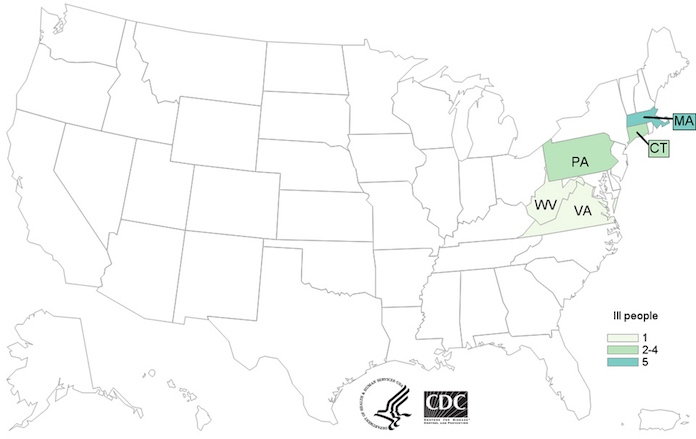The Centers for Disease Control and Prevention (CDC) released its final report into the investigation of an E. coli O157:H7 outbreak linked to Adams Farm beef products. That outbreak sickened 11 people in 5 states, an increase of 4 patients since the last update. Seven people were hospitalized, and one person developed hemolytic uremic syndrome (HUS).
The outbreak seems to be over, but officials are worried that the beef, veal, and bison products recalled by Adams Farm may still be in consumer’s freezers. Anyone who doesn’t know about this outbreak could still eat them and get sick.
The case count by state is: Connecticut (2), Massachusetts (5), Pennsylvania (2), Virginia (1), and West Virginia (1). The illness onset dates range from June 27, 2016 to September 10, 2016. Patients range in age from 1 year to 74, with a median age of 32.
Epidemiologic, traceback, and laboratory evidence indicates that beef products by Adams Farm Slaughterhouse, which is located in Athol, Massachusetts, were the likely source of this outbreak. Ground beef products are a common source of E. coli outbreaks. Seven people were interviewed by public health officials in this investigation. All seven ate ground beef the week before they got sick, and six, or 86%, of those people ate ground beef produced by Adams Farm Slaughterhouse.
In addition, the Connecticut Department of Public Health collected leftover Adams Farm ground beef from a restaurant and from a patient’s home. They found the outbreak strain of E. coli O157:H7 in both of the samples.
Adams Farm Slaughterhouse recalled cuts of beef, veal, and bison on September 24, 2016 as a result of this outbreak. Those products, which were sold to farmers’ markets, retail stores,and restaurants in Massachusetts, Connecticut, and eastern New York, had the establishment number EST. 5497 inside the USDA mark of inspection. The full list of recalled products is at the USDA web site.
Officials used the PulseNet system to identify patients who may be part of this outbreak. The outbreak strain of E. coli O157:H7 was identified by pulsed-field gel electrophoresis (PFGE).
If you purchased these recalled products, do not eat them, even if you cook them thoroughly. If you ate these recalled products and have been ill with the symptoms of E. coli food poisoning, see your doctor. Then call our attorneys for help to protect your legal rights.
The symptoms of an E. coli infection include severe abdominal cramps, diarrhea that may be bloody and/or watery, a mild fever, and possible nausea or vomiting. These symptoms usually start a few days after exposure to the pathogenic bacteria. In some people, especially the very young, this illness can progress to hemolytic uremic syndrome, a potentially life-threatening complication.
The symptoms of HUS include little to no urine output, lethargy, a skin rash, easy bruising, and bleeding from the nose or mouth. This illness can cause kidney failure, seizures, and death. Anyone with these symptoms must see a doctor immediately.
